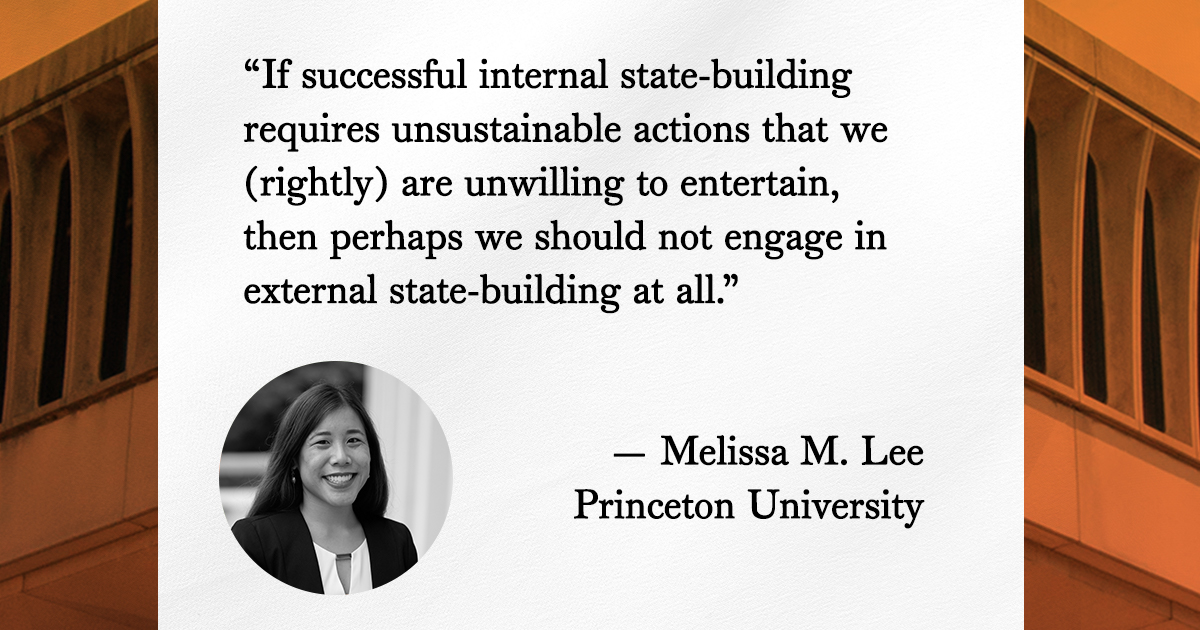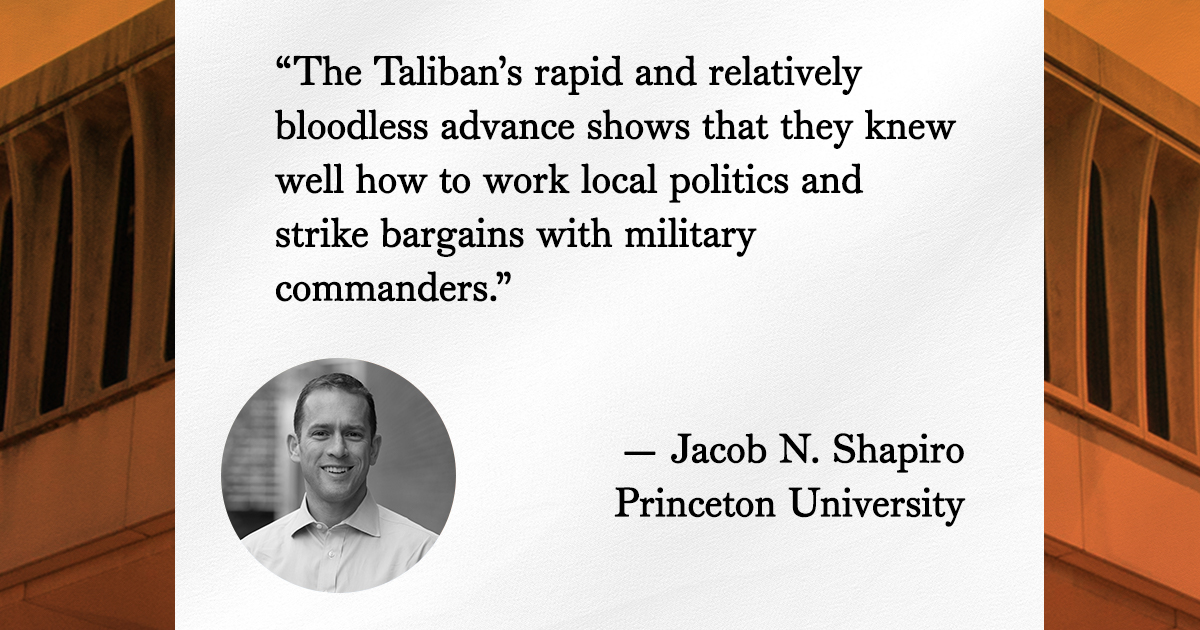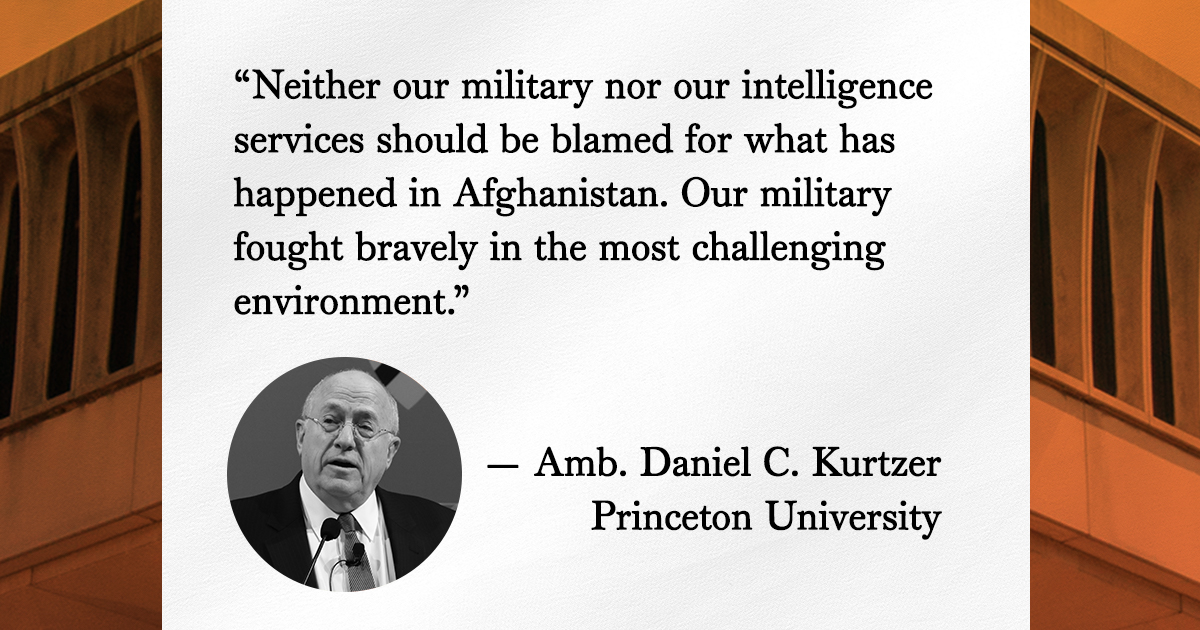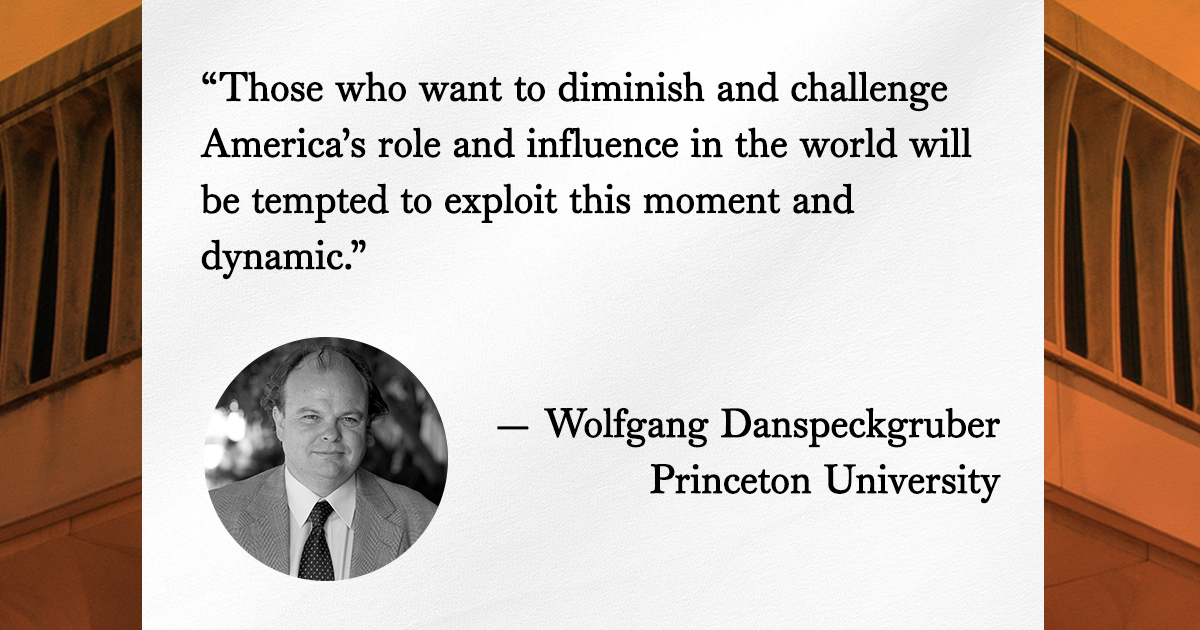The Taliban stormed Kabul on Sunday, stealing control of Afghanistan from the Afghan government. Now, Afghans and Americans present in the country are trying to flee the violence and chaos, as the United States sends more military troops to ensure their safe exits.
Just a few weeks shy of the 20th anniversary of 9/11, the takeover is a significant blow to the American military members, and their families, who died fighting to prevent additional terrorist attacks and build a democratic Afghan government. What’s next for the country and foreign relations remains uncertain.
We discussed the situation and its global implications with experts from the Princeton School of Public and International Affairs.
- Wolfgang Danspeckgruber is the founding director of the Liechtenstein Institute on Self-Determination and has been teaching on issues of state, self-determination, diplomacy, and crisis diplomacy at Princeton since 1988.
- Daniel C. Kurtzer is a lecturer in public and international affairs and the S. Daniel Abraham Visiting Professor in Middle East Policy Studies. Kurtzer served as U.S. ambassador to Egypt (1997-2001) and as U.S. ambassador to Israel (2001-2005).
- Melissa M. Lee is an assistant professor of politics and international affairs. She specializes in the international and domestic politics of state-building and state capacity.
- Jacob N. Shapiro is a professor of politics and international affairs and co-director of the Empirical Studies of Conflict Project. Shapiro studies political violence, economic and political development in conflict zones, security policy, and urban conflict.
Q. What does this takeover by the Taliban signify? And how did this happen?

Danspeckgruber: This is an event of historic proportions, especially in the manner it unfolded. It’s been developing since 2020 with increasing systematic and targeted killings, intimidation and harassment against women and community leaders, and the destruction of critical infrastructure and symbolic and important buildings by the Taliban — all without any serious international reaction or consequences.
The consequences, both human, strategic, and perceptive, are unfathomable. It’s not clear yet to what degree and range. There are serious questions about why it had to happen so virulently, chaotically, and profoundly damaging. Since it became clear that the United States and allies would withdraw, where were appropriate preparations? Where was the continued fighting capacity and will of the Afghan security forces? Why did Afghan leadership leave? What did the peace negotiations with the Taliban — begun in 2019 — really achieve, particularly after the Doha February agreement and release of 5,000 Taliban prisoners? Who are the masterminds and outside forces supporting and bolstering the Taliban?
Kurtzer: The key lesson for the United States is that we are not capable of transforming other societies into liberal democracies. We defeated the Taliban 20 years ago, but it did not disappear. Our efforts to create a more open political system, bolstered by a self-sustaining Afghan military force, proved illusory, as deeply rooted problems remained.
Lee: The fall of Kabul shows us the futility and hubris of American-style state-building. We thought we could engineer (in years) what took Western countries centuries to achieve: effective, stable, secure, progressive, market-oriented liberal democratic states. And we thought we could achieve that kind of state without engaging in the messy politics that characterize the historical processes of state-building: violence, exclusion, corruption, and coercion. Our error was not in rejecting that kind of approach to state-building, but rather in ignoring its implications for the feasibility of our mission in Afghanistan. If successful internal state-building requires normatively unsustainable actions that we (rightly) are unwilling to entertain, then perhaps we should not engage in external state-building at all.
Shapiro: Civil wars are inherently political. While American and NATO assistance could keep the Taliban militarily contained, they could not resolve the deep political challenges facing the country. The Taliban’s rapid and relatively bloodless advance shows that they knew well how to work local politics and strike bargains with military commanders. More than anything else, this victory signifies the centrality of politics in determining the outcome of such conflicts.
Q. What is next for Afghanistan and its citizens? What else can be done?
Danspeckgruber: This process is still going on; the Taliban is trying to establish power nearly house to house, all while the internationals try to evacuate their citizens and whoever has assisted. The country and its society is in a state of shock. Communities like the Hazara are feeling threatened. This is seemingly like a coup, so it depends also very much on outside interaction with the Taliban and its willingness to head to its promises and to establish human rights for all. There needs to be safety and stability and respect for all. There is also an increasing food shortage and much of the infrastructure, which was destroyed, has to be recreated.
Kurtzer: The most critical issue now is to remove the Americans and the Afghan citizens who worked with us over these two decades. For this purpose, we should be prepared to commit the necessary force for as long as it takes to provide for their safety. After that, there is not much we or anyone else can do to help Afghanistan escape the brutal rule of the Taliban.
Shapiro: The Taliban will face many of the same governance challenges that the Ghani regime faced, but with less external support. Greater poverty and slower growth will follow. If Taliban fail to govern, they too will face insurgencies.
What must be done now is to negotiate for the safe exit of those who worked with the international organizations and the U.S., as well as those who served in the former government. The Taliban have much to gain from diplomatic recognition and aid — those should be used as bargaining chips to protect those who risked so much for the United States.
Q. What does this mean for U.S. foreign affairs?

Danspeckgruber: It’s not fully clear yet in its extent and rage as well as in the consequences for our inherently unstable international system. It’s very negative for U.S. reputation and trust, which is certainly a challenge for maintaining allied relationships and expecting partners to rely on their relationship with the U.S., particularly when they find themselves in precarious situations. It depends on what happens in the next weeks in terms of humanitarian efforts and evacuation assistance.
All that might well contribute to increased instability in an already quite unruly international system, encourage radical elements elsewhere to move and exploit the current upheaval, and that might encourage a severe international arms race.
Kurtzer: The first item on our leaders’ checklist must be to define our vital national security interests. It was and remains vital to combat al Qaeda, the Islamic State of Iraq and Syria (ISIS), and their offshoots, but we have no business — and have had no success — in transforming the societies in which these terrorist groups operate.
Lee: The United States’ failure in Afghanistan will temper its appetite for armed interventions in so-called small wars, just as its failure in Vietnam haunted politicians for decades. It will also accelerate the refocusing of U.S. foreign policy around great power competition, and specifically around threats emanating from China and Russia.
Shapiro: While the sequencing of the withdrawal was tragic, this has been a plausible outcome for some time. The great foreign policy challenges of the next decade will lie in combatting democratic backsliding, making progress on climate change, and countering the Chinese model of technologically enabled authoritarianism. Disengagement from Afghanistan will have little bearing on our ability to accomplish these goals.
Q. What does this mean for the U.S. military?

Kurtzer: Neither our military nor our intelligence services should be blamed for what has happened in Afghanistan. Our military fought bravely in the most challenging environment, and many of our intelligence analysts spoke truth to power throughout our deployment in Afghanistan. The hubris and ignorance of our leaders — in particular, their inability to learn any lessons from the past — is at fault. Foreign policy should be informed and guided by experienced practitioners and experts, not politicians.
Lee: For a variety of bureaucratic and domestic political reasons, the U.S. military was tasked with a mission far outside its competence: The construction of a state. Part of that mission involved standing up a professional national army. But the task of building an army cannot be divorced from the political work of building a state that exercises effective and legitimate authority over society. To be sure, other parts of the U.S. government were engaged in the Afghan project, and many other governments as well as nongovernmental organizations assisted, as well. But the U.S. military had a lead role, and while it excels at many things, the Afghanistan experience shows us that it is not a one-size-fits-all tool.
Shapiro: The U.S. military needs to take a hard look at how it works to train, equip, and support partner forces. The U.S. mission in Afghanistan never developed a sustainable partner force, which could provide security for large parts of the country without outside support in terms of communications, intelligence, logistics, and training. Doing so may have been impossible given the Afghan political process and budget constraints, but the unexpectedly rapid collapse of the force we helped build demands study and a rethink of what is possible when it comes to supporting other nations.
Q. What are potential ripple effects for the Middle East?

Danspeckgruber: The announcement of a deadline of the allied withdrawal, the rapid departure of the international forces with chaotic and inhuman consequences, and the setting of a highly symbolic exit date at 9/11 all contributed to this.
The fall of the Afghan leadership is inspiring and encouraging radical militant forces elsewhere as it is seen as a victory over the U.S. and the West, independent from our own interpretation. Those who want to diminish and challenge America’s role and influence in the world will be tempted to exploit this moment and dynamic.
Kurtzer: Some will complain that U.S. credibility will suffer, but I disagree. We committed a tremendous amount of blood and treasure during these 20 years. It was Afghanistan, not the United States, that failed.
That said, in the immediate term, we may see an uptick in the activities of terrorist organizations, believing that the United States is in retreat. We must prove them wrong, by showing determination to fight terrorism wherever it is being planned or executed.
Shapiro: The effects will be small, though there will be significant new refuge flows. To be durable, the Taliban government will need to allow a good deal of local autonomy and prevent the use of their territory for international terrorism. If they do these things, the change of government will have little impact abroad.
Q. What does the U.S. withdrawal from Afghanistan and the Taliban takeover mean for other nations who have had a presence in the country?
Danspeckgruber: This is a very challenging issue, as most of these allies feel de facto forced out by the U.S. action due to practical dependence on American capabilities. There is also serious complaint about absence of consultation and coordination of how to best implement a withdrawal. The next weeks will show whether appropriate action can be taken to salvage whatever possible and stabilize Afghanistan and her region — most importantly to ascertain human rights for all.
Lee: The Afghan Taliban has long enjoyed support from Pakistan as a means of influence over Afghanistan’s foreign policy. Pakistan fears strategic encirclement by pro-India forces. Moreover, a friendly government in Kabul would be unlikely to inflame old disputes over territory between the two countries. The Taliban will likely continue to depend on Islamabad’s support, and that support will likely be forthcoming but measured due to Pakistan’s strategic interests that it must weigh against international backlash.
Shapiro: Sad as the political outcome has been, we should not lose sight of the fact that Afghanistan has been an incredible development success story over the last 20 years. Life expectancy at birth has gone from 55 years to 65 years. The infant mortality rate has dropped from 88 per 1,000 births in 2001 to 46.5 in 2019. The prevalence of stunting at age five has dropped from 59% in 2004 to 38% in 2018. While the status quo is still bad, the progress is massive. A key task for the world is now to help make sure those gains are not lost. The new challenge for other nations who have had a presence in the country is how to help the nation maintain those gains without enabling autocratic, repressive rule. No easy task.
SPIA Reacts is a series of interviews with SPIA experts addressing current events.


